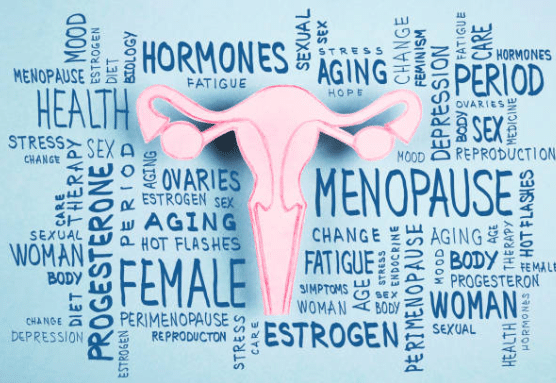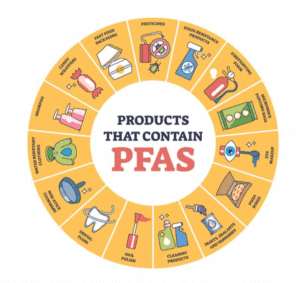Have you ever woke up thinking, “I just don’t feel like myself”?
Perimenopause can do that to you—it’s a phase of life that brings a whirlwind of change, both inside and out.
Waves of hot flashes disrupt your day, sleepless nights leave you drained, and moments of anxiety or frustration sneak up on you. Your once-predictable body suddenly feels like an enigma, leaving you wondering what’s happening.
Here’s the good news—you’re not alone and don’t have to simply “get through it.” Understanding the changes your body is going through can be empowering, and there are plenty of ways to manage this stage of life’s physical and emotional challenges.
You can regain balance, vitality, and control by making lifestyle adjustments and exploring treatment options..
This blog is here to help you make sense of perimenopause, demystify the discomforts, and provide practical strategies to feel more like yourself.

What is Perimenopause?
Perimenopause is the transitional phase that occurs 8-10 years before menopause, characterized by fluctuating hormone levels.
When It Begins: Perimenopause typically starts in a woman’s mid-40s or early 50s, earlier than the usual menopause age of 45-55. It concludes when menopause begins, confirmed after 12 consecutive months without a menstrual period.
Unfortunately, in today’s toxic world, it can start in your early 30’s.
Hormonal Changes
Your ovaries produce hormones that support the reproductive system. During perimenopause, estrogen and progesterone levels fluctuate until menopause. Studies are clear that the perimenopause phase lasts from a few months to up to years.
Initially it is progesterone levels that start to drop. Then estrogen levels begin to fluctuate and can have a chaotic change in levels from high to normal, to too low to very high. IT is this crazy fluctuation that makes you feel like you are possessed.
Menopause occurs when estrogen production decreases, stopping ovulation and ending the menstrual cycle, eliminating the chance of pregnancy.
Premature menopause happens before age 40, often due to premature ovarian failure or stress or medications. Hormone levels drop, and the ovaries stop producing eggs, and thus hormone production stops completely.
Symptoms of Perimenopause
Everyone’s body responds to hormonal changes differently. Some experience irregular periods, while others notice physical symptoms..
Symptoms
Some common symptoms include:
- Irregular periods
- Fatigue
- Weight gain
- PMS
- Migraines
- Hot flashes
- Night sweats
- Insomnia
- Loss of sex drive (libido)
- Bloating
- Fluid retention
- Itchy skin
- Nocturia (waking up at night to pee)
- Frequent urination
- Vaginal dryness
Mental Symptoms
Everyone thinks and behaves differently, leading to unique responses to various conditions. During perimenopause, hormonal imbalances can impact mental health, causing symptoms such as:
Mood swings in perimenopause:
- Anxiety
- Depression
- Mood Swings
- Forgetfulness
- Tearfulness
- Panic attacks
- Difficulty concentrating
- Low self esteem
These changes can be challenging, making it feel like you’re losing control, leading to frustration.

Perimenopause Diagnosis
Hormone tests can be used to determine the transition to menopause, although may not be entirely reliable because of the dramatic fluctuations in levels day to day.
Perimenopause Treatment
Doctors may prescribe antidepressants. However, these medications are often ineffective and only mask symptoms without addressing the underlying hormonal imbalance.
At Live Younger, we understand hormones and how to balance them naturally.
Progesterone is the most important hormone to consider at the start of the perimenopause. It is a neurosteroid, meaning it is a hormone that affects the brain. When progesterone is balanced and optimal, it brings about calm and a more restorative sleep.
Progesterone is so important for brain health that it is used as a therapy in Europe to protect the brain in TBI (traumatic brain injury).
Progesterone is the preferred therapy for mood symptoms and insomnia associated with the perimenopause.
Estrogen dominance is crucial to understand. Progesterone and estrogen are in balance with each other in a normal menstrual cycle. As progesterone levels drop, estrogen feels higher and out of balance. While it seems instinctive to add progesterone when the levels drop and the mood and mental symptoms of low progesterone occur, one has to also look at estrogen. It is not recommended to only raise the level of progesterone to bring about balance. It may be necessary to decrease the stimulation of estrogen receptors as well.
Endocrine disrupting chemicals (EDC’s) are common. These mimic the effects of estrogen in your body. A healthy digestive system is essential to eliminate estrogen metabolites. When you have constipation, you can accumulate estrogen and worsen symptoms like PMS, breast tenderness, bloating, fluid retention and cellulite. Your body feels like estrogen levels are too high and also can feel like progesterone levels are too low, even if progesterone levels are normal.
Lifestyle Changes
You can manage perimenopause at home without medications. Simply make the following lifestyle changes:
- Healthy Diet: It is important to consume whole foods, focus on adequate protein and fibre. Protein provides the building blocks for hormones. Fibre is important to keep your digestive system functioning for healthy hormone balance.
- Exercises: Relieve stress through exercise. Exercises like walking, hiking, and weight training improve your mood. Regular exercise maintains your body weight. When your stress hormones are out of balance, it affects other hormones and makes balancing hormones more difficult.
Increased muscle mass corrects insulin resistance, which impacts other hormones in your body.
PCOS is a hormone imbalance with insulin resistance as a key feature. While some women require hormone balancing, managing insulin resistance is of highest priority.
- Sleep hygiene: Taking progesterone is important for sleep. However poor sleep hygiene will detract from the sleep benefits of progesterone. Avoid use of screens before bedtime. Keep your room cool and dark. Have a consistent, calming routine before bed.
- Lower toxic burden: Focus on living a low toxin lifestyle. Learn about EDC’s. Toxins are everywhere. Body care, make up, household products are villainous sources of toxins. Not only do these interrupt the balance of estrogen and progesterone, making the perimenopause symptoms worse; they are ‘fat loving’ (fat soluble) and contribute to stubborn fat that is hard to get rid of.
- Alcohol and caffeine: Both of these can worsen the symptoms of the perimenopause. You can determine if these make you feel worse by avoiding them to assess the impact on how you feel.
- Liver Health: Your liver is the main organ that is responsible to help with hormone balancing. The cytochrome P450 enzyme system in the liver is the path through which hormones are metabolised, and the metabolites are transported out of the body when all systems function efficiently. Drugs and toxins compete for these pathways. This includes pesticides and herbicides in your food.
Liver support like Cell Deep Clean and The Optimizer play an important role in the health and functioning of of your liver enzyme pathways needed for hormone balancing.
- Stress management: Meditation and yoga help relieve stress.
Stress management is vital for overall hormone balancing.
Not Feeling Like Yourself? What You Can Do
Perimenopause can leave you feeling like a stranger in your own body. The emotional swings, physical discomforts, and mental fog can be overwhelming, making it seem like you’ve lost control. But here’s the truth: you’re not alone, and you do not have to suffer through this. Much like the adjustments you went through during puberty, perimenopause is another natural stage of change.
While the symptoms can be frustrating, understanding them is the first step. Perimenopause is your body’s way of transitioning, and once menopause arrives, you’ll likely more at ease. However, maintaining a healthy lifestyle during this time is crucial to minimizing discomfort and preparing for life after menopause. There are women who do not feel the symptoms of the perimenopause and menopause. It is thought that their lifestyle and stress management allow them to breeze through the transition without distress.
That is not the case for most women, especially in the western world. The impact of a high paced lifestyle, modern conveniences and products, a toxic environment and habits like alcohol, smoking and vaping all lead to more dramatic hormone imbalance.
How Live Younger Can Help
At Live Younger, we understand the challenges of perimenopause and are here to help you feel like yourself again.
Why Choose Us?
Live Younger is a private wellness clinic in Calgary with nearly two decades of expertise in bioidentical hormone replacement therapy and personalized wellness solutions. We specialize in restoring balance, vitality, and youthful energy by addressing the root causes of your discomfort—not just masking symptoms.
What Sets Us Apart?
- A holistic, integrative approach tailored to your unique needs
- Expert precision in hormone balancing to minimize risks associated with traditional hormone prescriptions
- A focus on healthy aging, longevity, and looking and feeling your best
Our Expertise Covers:
- Improved energy, sleep, and mood
- Weight loss and enhanced stamina
- Radiant skin with stronger collagen
- Better heart, brain, and bone health
- Cancer prevention through longevity science and testing
Take Control of Your Well-Being
You don’t have to endure perimenopause alone. With services like bioidentical hormones, functional medicine, anti-aging therapy, and more, our team of experts at Live Younger is ready to help you thrive during this transitional phase.
Regain your balance, vitality, and sense of self with tailored hormone therapy solutions. At Live Younger, our experts are here to guide you through this transition with personalized care. Don’t wait—book your consultation today and take the first step toward feeling like yourself again!
Call us at 403 37 2353


